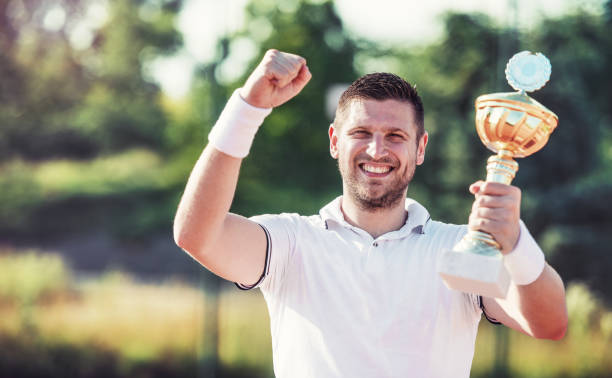Resilience is a word often tossed around in sports, but few embody it as vividly as the world’s top tennis players. The ability to recover quickly from difficulties, maintain focus under pressure, and transform setbacks into strengths is what separates the good from the great. What can we learn from their paths to excellence? This post dives into how tennis champions develop their incredible resilience, showcasing inspiring strategies that can help anyone build mental toughness in sports, work, or personal life.
Battling pressure on the global stage
Thriving on high-stakes moments
Professional tennis is relentless. Players face not just physical exhaustion, but also the immense psychological pressure of global attention, personal expectations, and the unyielding grind of the tour. Each Grand Slam match is a test not just of skill, but of nerve. How do champions handle the mental load?
Many adopt strategies like mindful breathing, in-match routines, and positive self-talk. Novak Djokovic, for instance, has spoken openly about harnessing the power of visualization and meditation to stay centered during matches. Serena Williams credits her focus and calm to rituals she practices between points, helping reset her mindset after lost games or difficult calls. For aspiring athletes, developing small repeatable habits like these can make bouncing back from stress more manageable.
Learning from loss
Every tennis player, even the greatest, experiences defeat. Losses on the court can sting deeply, especially when coupled with public scrutiny. Yet, champions become resilient because they treat setbacks as opportunities for learning.
Take Genie Bouchard. Highlighted for her early breakthrough and rapid climb through the rankings, Bouchard also faced well-documented injury struggles and a series of tough losses. Rather than giving up, she used these challenges as motivation to reassess her training, adapt her goals, and work on her mental game. Her story reminds us that resilience often grows out of adversity—not just in sport, but also in life.
The power of adaptability
Success in tennis requires constantly adapting to new opponents, surfaces, and playing styles. Champions excel because they thrive outside their comfort zones. Roger Federer is a prime example, reinventing his game numerous times across his career. After early setbacks, he refined his serve, volley, and mental approach, ultimately regaining his world number one ranking well into his 30s.
For anyone facing career or personal change, the lesson is clear: flexibility and the willingness to learn unfamiliar skills are keys to bouncing back. The most resilient people are those open to evolving.
Building mental toughness
Developing focus through routine
Day in and day out, tennis players spend hours on repetitive drills and fitness regimens. More than just physical preparation, these routines foster mental stamina. Simona Halep has described how her daily practice sessions, built around structure and clear objectives, anchor her even during slumps.
If you are striving for resilience, consider setting up a routine in your own life, whether that’s sticking to daily exercise, journaling, or dedicated work hours. Consistency builds discipline, and discipline builds toughness.
Positive self-talk and visualization
Champions rarely succeed on grit alone. Mental training is just as important as practice time on the court. Visualization techniques, where athletes picture themselves succeeding in key moments, have been adopted widely by tennis stars. They also employ positive self-talk to drown out negativity. Rafael Nadal, known for his relentless optimism even when behind, credits his mental approach as critical to his comeback victories.
Relying on a support team
Tennis players, while alone on court, are never truly solo in their journeys. Coaches, family, trainers, and therapists play crucial roles in helping athletes build confidence and persevere during slumps. Genie Bouchard, for instance, has spoken about the importance of finding the right coach to rebuild trust in her game.
For anyone looking to cultivate resilience, having a solid support system is vital. Whether it’s friends, colleagues, mentors, or family, surrounding yourself with encouragement can make a world of difference when adversity hits.
Using setbacks as springboards
Reframing failure
A common thread among tennis champions is their ability to see failure as temporary. They analyze their performances, seek feedback, and make specific adjustments. When Serena Williams lost a heartbreaker at the 2016 US Open, she analyzed the defeat, adjusted her tactics, and returned stronger for the Australian Open. Her story underlines that every failure is fertile ground for future growth.
Celebrating progress, not perfection
Too often, the pursuit of excellence can overshadow the joy of improvement. Tennis champions set ambitious, yet realistic goals and celebrate small wins along the way. Genie Bouchard’s post-injury returns weren’t always about winning titles, but about getting stronger each week, regaining confidence, and enjoying the sport again.
The most resilient people measure themselves by their own benchmarks, not by fleeting public approval.
Take the resilience of tennis champions off the court
Elite tennis athletes offer powerful lessons in perseverance, adaptability, and mental strength. Their experiences show us that resilience isn’t a fixed trait, but rather a skill that can be built, honed, and carried into all areas of life. Whether you face obstacles in the workplace, at home, or in your personal goals, adopting the mindset of a tennis champion can transform setbacks into stepping stones.
Start by building small routines, practice positive self-talk, and lean on your support system when things get tough. Over time, you’ll find that the resilience of champions isn’t limited to the court—but attainable by anyone willing to put in the work.



